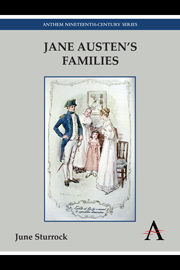Book contents
- Frontmatter
- Table of Contents
- Acknowledgements
- References and Abbreviations
- General Introduction
- Part I Family Dynamics
- Introduction
- Chapter One The Functions of the Dysfunctional Family: Northanger Abbey, Sense and Sensibility, Pride and Prejudice
- Chapter Two Spoilt Children: Pride and Prejudice, Mansfield Park and Emma
- Chapter Three “Usefulness and Exertion”: Mothers and Sisters in Sense and Sensibility, Mansfield Park, Emma and Persuasion
- Part II Fathers and Daughters
- Conclusion: “Creative Attention”
- Notes
- Select Bibliography
- Index
Chapter One - The Functions of the Dysfunctional Family: Northanger Abbey, Sense and Sensibility, Pride and Prejudice
from Part I - Family Dynamics
- Frontmatter
- Table of Contents
- Acknowledgements
- References and Abbreviations
- General Introduction
- Part I Family Dynamics
- Introduction
- Chapter One The Functions of the Dysfunctional Family: Northanger Abbey, Sense and Sensibility, Pride and Prejudice
- Chapter Two Spoilt Children: Pride and Prejudice, Mansfield Park and Emma
- Chapter Three “Usefulness and Exertion”: Mothers and Sisters in Sense and Sensibility, Mansfield Park, Emma and Persuasion
- Part II Fathers and Daughters
- Conclusion: “Creative Attention”
- Notes
- Select Bibliography
- Index
Summary
Without Satan, Paradise is not Lost and English poetry loses its great epic. Without malevolence or folly, knaves or fools, no narrative is possible. And in many narratives the encounter with folly or malevolence leads to enlightenment: Nietzsche writes that the wisdom of Oedipus and the understanding of Hamlet are bought by unnatural acts. In Jane Austen's fiction virtually every character and situation is affected by the flaws and contradictions on which narrative depends. When she proclaims that “pictures of perfection make me sick & wicked” (Letters 335), she writes, then, both as novelist and critic. Austen's own critics and admirers have often quoted these words; they provide the epigraph of Mary Waldron's Jane Austen and the Fiction of her Time and the title of Reginald Hill's clever detective story, Pictures of Perfection. There is good reason for such reiteration. None of her heroines is a picture of perfection in the mode of Hannah More's Lucilla, though Austen felt at one time that Anne Elliot – “almost too good for me” – came perilously near it (Letters 335) and though some critics have quite mistakenly assumed that she intended poor little Fanny Price as an epitome of the Evangelical virtues.
- Type
- Chapter
- Information
- Jane Austen's Families , pp. 15 - 32Publisher: Anthem PressPrint publication year: 2013



